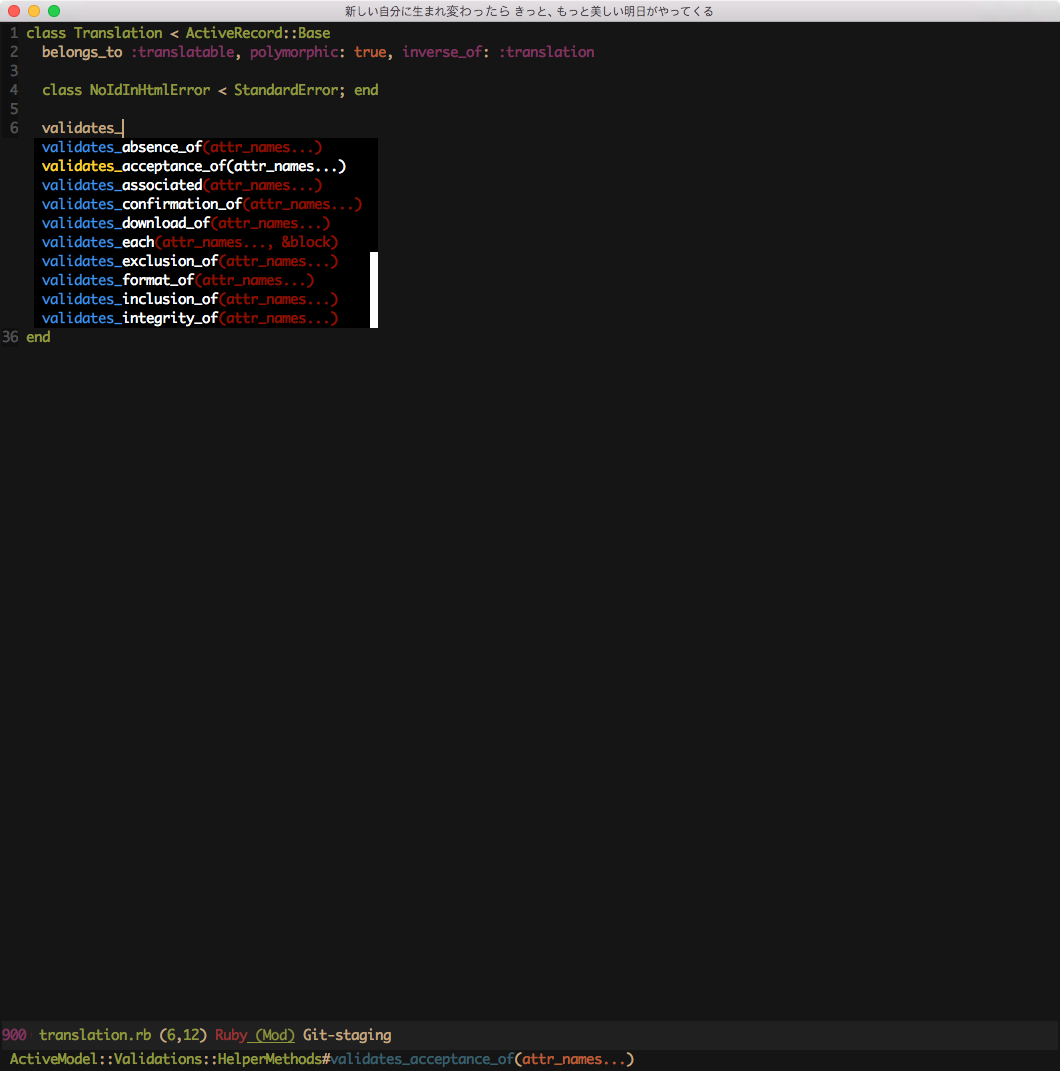-
有带智能提示的 Ruby IDE 吗? at January 23, 2015
https://github.com/dgutov/robe
支持上下文语义级别的代码提示,这个只支持 Emacs。
https://github.com/Valloric/YouCompleteMe#semantic-completion-for-other-languages 从 YCM 的文档上看,好像通过 Eclim 可以实现语义级别的 Ruby 代码提示,不过我不知道有没有人弄成功过。

-
高考录取,纠结多日,终得尘埃落定,高中课本终于可以卖掉了! at July 14, 2014
同学,你们高中数学教材是什么样的?能否照个照片或者告知下教材出版社?
-
再回顾一遍 Ruby Gotchas at April 30, 2014
http://ruby-china.org/topics/17742
这精华加的太随便了吧,现在这种加精华的方式还不如以前按喜欢来排列,至少以前的方式就不会出现这种问题。
-
Array of Array Appending at April 29, 2014
#1 楼 @santochancf よくやった、達也君 :thumbsup:
x = [[]] * 4 puts x.each {|a| puts a.object_id } x = Array.new(4) { [] } puts x.each {|a| puts a.object_id } # >> 70261926896280 # >> 70261926896280 # >> 70261926896280 # >> 70261926896280 # >> 70261926887120 # >> 70261926887100 # >> 70261926887060 # >> 70261926887040 -
有什么能用的极简的论坛 / 小组? at April 24, 2014
-
一个 Git 的问题 at April 24, 2014
#8 楼 @1272729223 你 dev 是从哪个分支 checkout 出来的?master?如果切回 master 还有,你把里面该删的删了,commit,切回 dev 不就完了。
-
一个 Git 的问题 at April 24, 2014
.gitignore 只影响 Git 是否 Track 这些文件,而不是影响你的工作目录下面到底有什么。
如果你创建 dev branch 时的 branch 没有这些文件夹,那么你在 dev commit 之后,切换回去就不应该有。
-
有什么能用的极简的论坛 / 小组? at April 24, 2014
Basecamp and Campfire 都有免费的版本,如果不超过 3 个人。
-
[求助] Core::User 转换成 ‘core/user’ 和 :core_user 怎么写比较简单? at April 07, 2014
require 'active_support/inflector' Core::User.name.underscore # => "core/user" Core::User.name.underscore.gsub('/', '_').to_sym # => :core_user -
求教大神数组内对象不重复 (已解决) at April 07, 2014
* Removed deprecated `Array#uniq_by` and `Array#uniq_by!`, use native `Array#uniq` and `Array#uniq!` instead.4.1 就要删掉了,因为本身 Ruby 的
Array#uniq方法就可以接收 block,不过我觉得uniq_by这个名字还是比uniq更适合在后面接 block。 -
求教大神数组内对象不重复 (已解决) at April 05, 2014
740 # Specifies whether the records should be unique or not. For example: 741 # 742 # User.select(:name) 743 # # => Might return two records with the same name 744 # 745 # User.select(:name).distinct 746 # # => Returns 1 record per distinct name 747 # 748 # User.select(:name).distinct.distinct(false) 749 # # => You can also remove the uniqueness 750 def distinct(value = true) 751 spawn.distinct!(value) 752 end 753 alias uniq distinct 754 755 # Like #distinct, but modifies relation in place. 756 def distinct!(value = true) # :nodoc: 757 self.distinct_value = value 758 self 759 end 760 alias uniq! distinct!alias 过了,一个意思,我倒觉得楼主没考虑那么多。
PS:话说这文档是不是错了?distinct 了两次?
-
求教大神数组内对象不重复 (已解决) at April 04, 2014
Array#uniq Array#uniq! -
a.blank? ? b : a 怎么写来的方便? at April 04, 2014
require 'active_support/core_ext/object/blank' a.presence || b -
Software Design 中文版 第一期 样书 at April 01, 2014
-
“Welcome aboard” 页面是如何生成的? at March 30, 2014
-
如何快速判断一个 hash 里是否有 nil 或者空值 at March 23, 2014
-
如何快速判断一个 hash 里是否有 nil 或者空值 at March 23, 2014
-
如何快速判断一个 hash 里是否有 nil 或者空值 at March 23, 2014
a = { b: "xxx", c: "lll", d: "ooo", f: "ui" } params = {} params[:a] = { b: "x", c: "c", d: "ds", f: "f", g: "g" } params[:b] = { b: "x" } params[:c] = { b: "x", c: "c", d: "ds", f: "", g: "g" } def not_empty(str) str.to_s.strip.length != 0 end a.all? { |key, _| params[:a].has_key?(key) && not_empty(params[:a][key]) } # => true a.all? { |key, _| params[:b].has_key?(key) && not_empty(params[:b][key]) } # => false a.all? { |key, _| params[:c].has_key?(key) && not_empty(params[:c][key]) } # => false从@rei的方法改的,有 ActiveSupport 的话,用 present?就行。
-
我们不组织个 “每周一题” 之类的活动吗? at March 22, 2014
-
重复代码怎么才能更好的消除? at March 18, 2014
def restore_record(record_id, activities) self.send("restore_#{self.name.downcase}", record_id, activities) if can_restore? end def can_restore? ["Prize", "Apply", "Activity"].include?(self.name) end def restore_prize(record_id, activities) activity_ids = activities.map(&:id) record = self.deleted.find(record_id) record.restore if activity_ids.include?(record.activity_id) end def restore_apply(record_id, activities) activity_ids = activities.map(&:id) record = self.deleted.friendly.find(record_id) self.restore(record.id, :recursive => true) if activity_ids.include?(record.activity_id) end def restore_activity(record_id, activities) record = self.deleted.friendly.find(record_id) self.restore(record.id, :recursive => true) if activities.include?(record) end不要
return true或者return false。另外我也没觉得代码有多少重复的地方。我倒觉得这个方法本身返回布尔值很不合理。从
restore_record的方法名看,这个方法不应该返回布尔值,只要不依赖返回值,一堆条件语句删了后,应该好些,具体的还要根据实际情况自己重构,没有上下文,基本上是谈不上重构。另外,推荐你调用方法的时候把括号加上,方法参数也是
-
我们不组织个 “每周一题” 之类的活动吗? at March 11, 2014
#39 楼 @quakewang 挺简洁的实现方法,我没想到有这么个思路。
我觉这个 before_filter 不算很简单,也不算很难,但想实现的好也是绝对不是一件简单的事,其实比较符合我的初衷。
-
我们不组织个 “每周一题” 之类的活动吗? at March 10, 2014
-
我们不组织个 “每周一题” 之类的活动吗? at March 10, 2014
更新一下我预想的一道题:
例如实现一个 Rails 中的 before_filter 或者 around_filter:
class PeopleController < ApplicationController before_filter :locate_person, :only => [:show, :edit, :update] def show puts "showing a person's data" end def edit puts "displaying a person edit form" end def update puts "committing updated person data to the database" end def create puts "creating a new person" end def locate_person puts "locating a person" end end或者是实现一个简单的 XML Builder 之类的,我所想的题目应该是尽可能和 Ruby 相关的,题目看一眼所有人都明白意思,不会对题目本身有什么疑惑,题目本身也没有不需要很严格的限制,例如输入、输出。
题目的解决时间根据个人水平的不同,花费 15-60 分钟为最佳。因为我觉得像这样的余兴活动,只有在不花费过多时间的情况下,才可以长久。
-
我们不组织个 “每周一题” 之类的活动吗? at March 10, 2014
#29 楼 @ctrlaltdeletel 我预想的题目不是这种 Puzzle 类的风格,就是类似:
The Problem: Example Input: Example Output:
这种类似 ACM 的题目,我觉得很多时候,使用 Ruby 都不如其它语言合适,而且很容易写成算法类的代码,就像我在顶楼提到的后面一种。
Thin 作者这个属于撘个脚手架,你来进一步完成,这也不太适合在论坛展开啊,太广了。
-
我们不组织个 “每周一题” 之类的活动吗? at March 10, 2014
-
我们不组织个 “每周一题” 之类的活动吗? at March 09, 2014
-
我们不组织个 “每周一题” 之类的活动吗? at March 09, 2014
-
我们不组织个 “每周一题” 之类的活动吗? at March 09, 2014